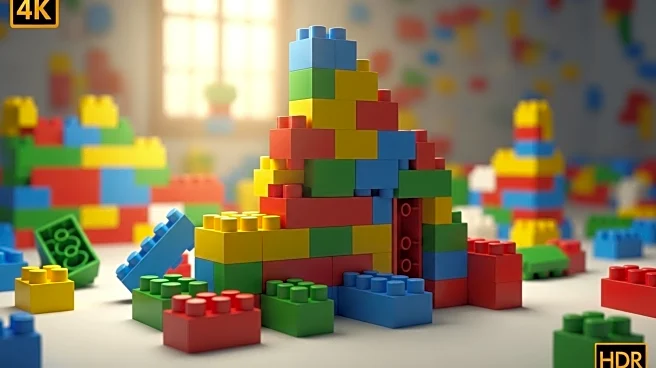What's Happening?
Lego has reported its best first half in company history, with revenue increasing by 12% to 34.6 billion DKK ($5.4 billion), operating profit rising by 10%, and net profit reaching 6.5 billion DKK. The company achieved these results by expanding its product offerings and strategically aligning with cultural trends. Lego launched 314 new sets in six months, including botanical bouquets for adults and themed sets like Formula 1 cars, Bluey playsets, and One Piece pirates. These offerings cater to diverse interests, ensuring broad appeal across different demographics. Additionally, Lego has expanded its physical presence by opening 24 new stores globally, including its first in India, and plans to open a new factory in Vietnam and a $1.5 billion site in Virginia by 2027.
Why It's Important?
Lego's strategic expansion and cultural alignment have significant implications for the toy industry and consumer brands. By diversifying its product line and tapping into various fan bases, Lego has created a robust growth engine that appeals to a wide range of consumers. This approach not only boosts sales but also strengthens brand loyalty, as consumers find products that resonate with their interests. The expansion of physical stores highlights the importance of experiential retail, where consumers can engage with the brand in a tangible way. Lego's success demonstrates the potential for brands to leverage cultural trends and community engagement to drive growth and profitability.
What's Next?
Lego's continued expansion into new markets and its strategic partnerships suggest ongoing growth and innovation. The upcoming launch of a $1.5 billion site in Virginia by 2027 indicates a commitment to increasing production capacity and meeting growing demand. As Lego continues to align with cultural trends and expand its product offerings, it is likely to maintain its strong market position. The company's focus on experiential retail and community engagement may inspire other brands to adopt similar strategies, potentially reshaping the retail landscape.
Beyond the Headlines
Lego's approach to brand expansion highlights the importance of cultural relevance and community engagement in modern marketing. By creating products that resonate with diverse interests, Lego fosters a sense of belonging among consumers, encouraging them to become part of the brand's community. This strategy not only drives sales but also enhances brand loyalty and consumer satisfaction. As more brands recognize the value of cultural alignment and experiential retail, the industry may see a shift towards more personalized and community-focused marketing strategies.









